

The Young Scholar Awards for Outstanding Research on American Muslims, awarded by the Institute for Social Policy and Understanding, recognizes an emerging leader whose research focuses on American Muslims. Meet the winners of our 2021 Young Scholar Awards:
1st Place
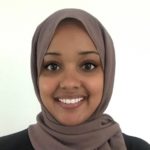
Samah Choudhury
University: PhD, Islamic Studies, University of North Carolina at Chapel Hill
Research Topic: What Makes Humor Muslim?
What did Samah do? How is Islam performed and articulated through the popular discourse of standup comedy? The researcher utilized multidisciplinary methods for this study, including historical, theoretical, and critical content analysis of Aziz Ansari, Kumail Nanjiani, and Hasan Minhaj’s standup comedy routines, films, and television shows. The researcher approached their work as primary sources and place them within a broader lineage of colonialism, race and racialization, secularity, and Muslim normativities in a transnational United States. The researcher coupled these primary sources against theoretical insights from race and feminist scholars who have attended specifically to embodied realities and how they are forged by, against, and within historical forces and social institutions. This is, principally, a historical investigation of an instructive moment in American public life and popular culture.
What did Samah’s research discover? Through a critical analysis of the standup comedy routines of comedians Aziz Ansari, Kumail Nanjiani, and Hasan Minhaj, Samah argues that these men step into their Muslim identities through the language and (hostile implications) of racialization. A Right Muslim self is cultivated, upholding secular ideals like “diversity” by taming bodily comportments that may otherwise affiliate them with Islam outside the boundaries of “racial” difference. Islam as a racial category finds social legibility. Islam as a religious category, however, is limited in its recourse.
Why does it matter? Samah’s research on American Muslim humor impacts scholarly and popular understandings of Islam in the secular public square, urging a collective focus on the ways that Islam is constructed not just in spheres we would deem explicitly “religious,” but also in the arts and how they have in fact facilitated the rise and cultural prominence of Muslims in the American imagination.
2nd Place
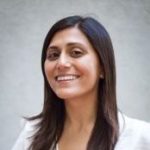
Masooma Haider
University: MA, International Relations at University of Chicago
Research Topic: The New Muslim Representatives: Analyzing the Unprecedented Rise in Muslim American Civic Participation after 2016
What did Masooma do? The years following the 2016 US presidential elections witnessed an unprecedented increase in Muslim American political candidacies. Existing literature has oft-attributed changes in civic participation to periods of increased stigmatization. However, an empirical puzzle emerges in consideration of the comparable levels of stigmatization against Muslim Americans that existed both in 2016, around the time of the Trump election, and in 2001, post-9/11.
What did Masooma’s research discover? The major finding of this study is that the rise in Muslim American civic participation may in fact represent a crucial shift in political identities between first and second (and pre versus post-9/11) generation Muslim Americans, a theory that is termed the Changing of the Guards. The findings challenge the prior consensus on reactionary responses to stigmatization, and revise theories on the role of institution building. The study highlights the incredible ability of young Muslim Americans to mobilize in spite of a climate of exclusion.
Why does it matter? This is the first rigorous research study to assesses the empirical puzzle of why a sudden rise in Muslim American engagement occurred in the time following 2016 despite comparable levels of Islamophobia in prior periods. It is likewise the first to address the theoretical puzzle created by theories of stigmatization which fail to explain the increase, rather than decline, in participation that occurred. The research findings have major implications for future research in the field of Muslim American civic studies, introducing the key discovery of the Changing of the Guards. This theory on shifting political identities and generational divergence sheds light on the deep, pivotal changes currently taking place within the demographic. By moving past theories of assimilation, the research puts to rest a narrative that has for too long dominated research on Muslim American civic participation.
3rd Place

Naheed Ahmed
University: PhD, Family Science at University of Maryland College Park
Research Topic: Measurement of Perceived Interpersonal and Societal Anti-Muslim Discrimination in the United States
What did Naheed do? Hate crimes against Muslim Americans have increased exponentially in the past 20 years, but there are few scales for measuring the spectrum of perceived anti-Muslim discrimination in the U.S.
What did Naheed’s research discover? To fill this gap this study used a mixed methods approach to develop novel scales for measuring perceived anti-Muslim discrimination. The Anti-Muslim indexes were developed and validated using qualitative and quantitative data.
Why does it matter? Despite years of growing animosity toward Muslims, understanding of the health implications of anti-Muslim discrimination is limited. There is a dearth of research on this topic given the significant challenges in undertaking research on anti-Muslim discrimination and health, most notably the lack of health data on Muslims and absence of a scale for measuring the spectrum of anti-Muslim discrimination in the U.S. This study addresses the latter barrier in terms of using a mixed methods approach in the development and validation of novel instruments for measuring perceived anti-Muslim discrimination in the U.S.
1st Place

Samah Choudhury
University: PhD, Islamic Studies, University of North Carolina at Chapel Hill
Research Topic: What Makes Humor Muslim?
2nd Place

Masooma Haider
University: MA, International Relations at University of Chicago
Research Topic: The New Muslim Representatives: Analyzing the Unprecedented Rise in Muslim American Civic Participation after 2016
3rd Place

Naheed Ahmed
University: MA, International Relations at University of Chicago
Research Topic: The New Muslim Representatives: Analyzing the Unprecedented Rise in Muslim American Civic Participation after 2016
2021 Winners
1st Place
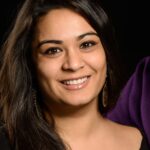
Samah Choudhury
University: PhD, Islamic Studies, University of North Carolina at Chapel Hill
Research Topic: What Makes Humor Muslim?
What did Samah do? How is Islam performed and articulated through the popular discourse of standup comedy? The researcher utilized multidisciplinary methods for this study, including historical, theoretical, and critical content analysis of Aziz Ansari, Kumail Nanjiani, and Hasan Minhaj’s standup comedy routines, films, and television shows. The researcher approached their work as primary sources and place them within a broader lineage of colonialism, race and racialization, secularity, and Muslim normativities in a transnational United States. The researcher coupled these primary sources against theoretical insights from race and feminist scholars who have attended specifically to embodied realities and how they are forged by, against, and within historical forces and social institutions. This is, principally, a historical investigation of an instructive moment in American public life and popular culture.
What did Samah’s research discover? Through a critical analysis of the standup comedy routines of comedians Aziz Ansari, Kumail Nanjiani, and Hasan Minhaj, Samah argues that these men step into their Muslim identities through the language and (hostile implications) of racialization. A Right Muslim self is cultivated, upholding secular ideals like “diversity” by taming bodily comportments that may otherwise affiliate them with Islam outside the boundaries of “racial” difference. Islam as a racial category finds social legibility. Islam as a religious category, however, is limited in its recourse.
Why does it matter? Samah’s research on American Muslim humor impacts scholarly and popular understandings of Islam in the secular public square, urging a collective focus on the ways that Islam is constructed not just in spheres we would deem explicitly “religious,” but also in the arts and how they have in fact facilitated the rise and cultural prominence of Muslims in the American imagination.
2nd Place
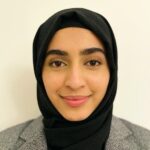
Masooma Haider
University: MA, International Relations at University of Chicago
Research Topic: The New Muslim Representatives: Analyzing the Unprecedented Rise in Muslim American Civic Participation after 2016
What did Masooma do? The years following the 2016 US presidential elections witnessed an unprecedented increase in Muslim American political candidacies. Existing literature has oft-attributed changes in civic participation to periods of increased stigmatization. However, an empirical puzzle emerges in consideration of the comparable levels of stigmatization against Muslim Americans that existed both in 2016, around the time of the Trump election, and in 2001, post-9/11.
What did Masooma’s research discover? The major finding of this study is that the rise in Muslim American civic participation may in fact represent a crucial shift in political identities between first and second (and pre versus post-9/11) generation Muslim Americans, a theory that is termed the Changing of the Guards. The findings challenge the prior consensus on reactionary responses to stigmatization, and revise theories on the role of institution building. The study highlights the incredible ability of young Muslim Americans to mobilize in spite of a climate of exclusion.
Why does it matter? This is the first rigorous research study to assesses the empirical puzzle of why a sudden rise in Muslim American engagement occurred in the time following 2016 despite comparable levels of Islamophobia in prior periods. It is likewise the first to address the theoretical puzzle created by theories of stigmatization which fail to explain the increase, rather than decline, in participation that occurred. The research findings have major implications for future research in the field of Muslim American civic studies, introducing the key discovery of the Changing of the Guards. This theory on shifting political identities and generational divergence sheds light on the deep, pivotal changes currently taking place within the demographic. By moving past theories of assimilation, the research puts to rest a narrative that has for too long dominated research on Muslim American civic participation.
3rd Place
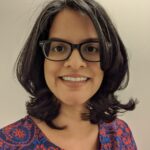
Naheed Ahmed
University: PhD, Family Science at University of Maryland College Park
Research Topic: Measurement of Perceived Interpersonal and Societal Anti-Muslim Discrimination in the United States
What did Naheed do? Hate crimes against Muslim Americans have increased exponentially in the past 20 years, but there are few scales for measuring the spectrum of perceived anti-Muslim discrimination in the U.S.
What did Naheed’s research discover? To fill this gap this study used a mixed methods approach to develop novel scales for measuring perceived anti-Muslim discrimination. The Anti-Muslim indexes were developed and validated using qualitative and quantitative data.
Why does it matter? Despite years of growing animosity toward Muslims, understanding of the health implications of anti-Muslim discrimination is limited. There is a dearth of research on this topic given the significant challenges in undertaking research on anti-Muslim discrimination and health, most notably the lack of health data on Muslims and absence of a scale for measuring the spectrum of anti-Muslim discrimination in the U.S. This study addresses the latter barrier in terms of using a mixed methods approach in the development and validation of novel instruments for measuring perceived anti-Muslim discrimination in the U.S.
1st Place
Samah Choudhury
University: PhD, Islamic Studies, University of North Carolina at Chapel Hill
Research Topic: What Makes Humor Muslim?
2nd Place
Masooma Haider
University: MA, International Relations at University of Chicago
Research Topic: The New Muslim Representatives: Analyzing the Unprecedented Rise in Muslim American Civic Participation after 2016
3rd Place
Naheed Ahmed
University: PhD, Family Science at University of Maryland College Park
Research Topic: Measurement of Perceived Interpersonal and Societal Anti-Muslim Discrimination in the United States
2019 Winners
1st Place

Nina Daoud
University: PhD, University of Maryland
Research Topic: Verily, with Hardship There is Ease: Examining the Intersections of Race, Religion, and Gender for Black Muslim Women in College
What did Nina do? Nina’s research on Black Muslim women recognizes the distinct experiences of this population, using an intersectional approach to understanding how their college experiences are shaped by multiple identities. She conducted interviews about pre-college experiences and the college transition, and completed on-campus observations.
What did Nina’s research discover? Nina’s written portraits present a glimpse into how the pre-college experiences of Black Muslim women shape their college experiences, particularly as they relate to their multiple identities. Her findings demonstrate that Black Muslim women’s college experiences are inextricably linked with their experiences outside college, particularly as it relates to their sense of belonging while in college. Her study offers a snapshot of how anti-Muslim rhetoric post-9/11, historical and current manifestations of anti-Blackness, and the culture of patriarchy shapes the experiences of Black Muslim women college students.
Why does it matter? Nina’s research complicates our understanding of what it means to be Muslim, challenging the notion that Muslims in the U.S. are primarily Arab or South Asian, as often portrayed in the media. Understanding the college experiences of this population can assist student affairs practitioners in creating programs to better support students from diverse racial and religious backgrounds
2nd Place

Nazita Lajevardi
University: PhD, University of California, San Diego
Research Topic: Invisible No More: The Politics of Resentment Toward Muslim Americans
What did Nazita do? Nazita’s work focuses on a broad question: to what extent do Muslim Americans face discrimination by legislators, the media, and the masses? She used survey experiments, field experiments, and text analysis of media transcripts to explore this question, including the development of a tool she developed to assess anti-Muslim attitudes, called Muslim American Resentment (MAR).
What did Nazita’s research discover? Muslim Americans are grossly marginalized. The public views them negatively, legislators ignore them, and the media communicates them frequently in gross disproportion to their group size. In her research, Nazita traces the diverse history of Muslim in America, introduces the a tool she developed to assess anti-Muslim attitudes (MAR), shows the impact of MAR on public opinion and political behavior, assesses anti-Muslim sentiment from mainstream news broadcasts from 1992 to 2015 compared against Latinos, Asian Americans, and Black Americans, and uses framing experiments to improve mass attitudes about and policy preferences affecting American Muslims.
Why does it matter? Nazita’s work is the first to provide a comprehensive assessment of discrimination by the legislators, the media, and the masses—and shows that this treatment isn’t inconsequential. Muslim Americans are affected by this discrimination in significant and anti-democratic ways.
3rd Place

Amelia Noor-Oshiro
University: PhD student at Johns Hopkins University
Research Topic: Muslim Visibility, Islamophobic Discrimination and Hypervigilance as Predictors of Stress and Depression among Muslims in the United States: A Cross-Sectional Study
What did Amelia do? Amelia’s study explored how Muslim visibility, Islamophobic discrimination, and hypervigilance relate to outcomes of stress and depression among Muslim men and women. In particular, the study sought to capture how visibility as a Muslim contributes to previously studied concepts of minority stress.
What did Amelia’s research discover? Amelia’s findings indicate that visibility is associated with more hypervigilance for women, and that hypervigilance is associated with more perceived stress and depressive symptoms among women and men. Visibility also marginally predicts depressive symptoms among women. For men, visibility is a significant predictor of depressive symptoms. Among both genders, Islamophobic discrimination was significantly associated with hypervigilance, perceived stress, and depressive symptoms.
Why does it matter? Amelia’s study is the first rigorously conducted research that aims to capture the question on the minds of many Muslims in America today: What difference does it make to my health to be visibly Muslim? This is the first study to capture both Muslim visibility and hypervigilance, and contributes to the discovery of how being visibly Muslim affects mental health. This research was utilized for training mental health professionals and to propose clinical interventions.
1st Place

Nina Daoud
University: PhD, University of Maryland
Research Topic: Verily, with Hardship There is Ease: Examining the Intersections of Race, Religion, and Gender for Black Muslim Women in College
2nd Place

Nazita Lajevardi
University: PhD, University of California, San Diego
Research Topic: Invisible No More: The Politics of Resentment Toward Muslim Americans
3rd Place

Amelia Noor-Oshiro
University: PhD student at Johns Hopkins University
Research Topic: Muslim Visibility, Islamophobic Discrimination and Hypervigilance as Predictors of Stress and Depression among Muslims in the United States: A Cross-Sectional Study
2017 Winners
1st Place
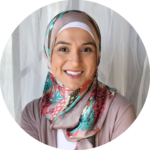
Marwa I. Abdalla
University: MA candidate in Communication, San Diego State University
Research Topic: How do I explain this to my children? An Auto-Ethnographic Investigation of Mother-Child Communication Surrounding Sexism, Racism, and Islamophobia
What did Marwa do? Marwa’s research explores how parents communicate with their children, answer difficult questions, and share their past experiences with complex and often painful topics. In this study, Marwa and two other mothers recorded notes of moments in which they communicated with their children about negative social phenomena over the course of 12 weeks. They also conducted and transcribed interviews with their spouses and children. Throughout their research, the three discussed their data in-person in an effort to refine their focus and better identify the most prominent patterns.
What did Marwa’s research discover? Marwa’s research showed that there are many ways for parents to communicate with their children about their gender, racial, and religious identities and to encourage them to challenge sexism, racism, and Islamophobia. Rather than focus on just one type of communication, Marwa hoped the personal experiences highlighted in the study show that when it comes to family communication, one size does not necessarily fit all.
Why does it matter? For many parents, explaining sexism, racism, and Islamophobia to their children is a challenge. There is a need, especially among Muslim parents, to better understand how to communicate with their children in the face of such negative social phenomena. Communication scholarship has given much focus to representation of Muslims in the media but little scholarship on the personal experiences of Muslims. Marwa’s research aims to fill this gap. Marwa has thus shared this work with university audiences, government officials, in radio and television interviews, and at numerous faith centers.
2nd Place
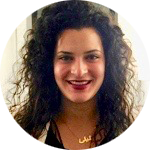
Laila Noureldin
University: PhD candidate in Sociology, University of Chicago
Research Topic: Assimilation and/or Alienation? Construct Reconceptualization Using American Muslim Religiosity and Immigrant Generation-Levels
What did Laila do? Laila’s study examined how religiosity and immigrant generation-level are related to American Muslim assimilation and alienation using the nationally representative 2011 Pew Muslim American Survey.
What did Laila’s research discover? ‘Very Religious’ American Muslims have both the highest levels of assimilation and alienation. Those Muslims born outside the U.S. who immigrated before the age of 18 have the highest assimilation levels, while native-born American Muslims have the highest alienation levels.
Why does it matter? The American media often depicts Muslim and American identities as incompatible; yet, few studies analyze how American Muslims view their own social integration. Assimilation literature primarily focuses on Hispanic immigration. As an ethnically diverse religious population, the American Muslim experience is missing from this literature. What’s more, immigration research and policy has been a hotly debated subject, and the American Muslim experience, especially with increases in Syrian refugee migration, further complicates this issue. Laila hopes this work will fill this gap in our understanding of integration processes and will create networks for social change for American Muslims through interfaith dialogue and civic engagement.
3rd Place
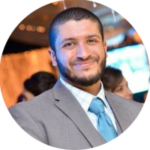
Youssef Chouhoud
University: PhD candidate in Political Science and International Relations, University of Southern California
Research Topic: Modern Pathways to Doubt in Islam
What did Youssef do? Youssef’s research explores what drives religious doubt among American Muslims. His study consists of 31 in-depth interviews with imams, university chaplains, and youth coordinators. Because this is the first study of its kind, Youssef’s objective was to provide a baseline reference point for understanding the sources of doubt in the American Muslim community.
What did Youssef research discover? Youssef identified three core sources of doubt:
- Moral and social concerns (e.g., gender roles, sexuality)
- Philosophical and scientific concerns (e.g., theory of evolution, the problem of evil)
- Personal trauma (e.g., abuse, community racism, a family death)
He also found that the problem of doubt in the American Muslim community is not simply of magnitude but also of frequency; interviewees reported encountering doubting people semi-regularly, on average.
Why does it matter? At a time when the U.S. population as a whole is becoming less and less religious, the need for a more systematic assessment of doubt in the American Muslim community is especially urgent. As religious minorities, American Muslims find themselves in an environment that presents unique challenges to the maintenance of their faith. Youssef’s study provides an easy-to-understand framework for making sense of this complex subject. He is also currently working on a survey that would assess how much his findings coincide with the reality at the broader community level. Additionally, a number of youth groups, mosques, and Muslim Student Associations have already used this work as a teaching tool.
1st Place

Marwa I. Abdalla
University: MA candidate in Communication, San Diego State University
Research Topic: How do I explain this to my children? An Auto-Ethnographic Investigation of Mother-Child Communication Surrounding Sexism, Racism, and Islamophobia
2nd Place

Laila Noureldin
University: PhD candidate in Sociology, University of Chicago
Research Topic: Assimilation and/or Alienation? Construct Reconceptualization Using American Muslim Religiosity and Immigrant Generation-Levels
3rd Place

Youssef Chouhoud
University: PhD candidate in Political Science and International Relations, University of Southern California
Research Topic: Modern Pathways to Doubt in Islam

